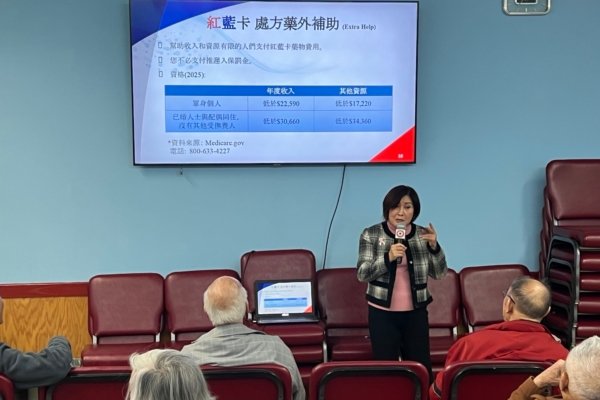The current period is the annual open enrollment for Medicare, aimed at helping elderly in the community understand the latest benefit changes for 2025. On November 20th, the New York Chinese Community Center held a seminar titled “2025 Medicare Major Changes Explanation”, inviting seasoned experts to provide detailed explanations. Many elderly attendees participated in the event and engaged in lively interactions.
Former Social Security Administration community liaison, Huang Yuxia, served as the main speaker. She stated that the changes to Medicare in 2025 mainly focus on three aspects: (1) Changes to the Special Enrollment Period (SEP) rules for beneficiaries eligible for low-income subsidies or medical assistance; (2) The significant adjustments to Part D (prescription drug coverage) structure due to the “Inflation Reduction Act” (IRA); (3) Addition of dental benefits to the dual-eligible advantage plan in New York State.
The alteration to the Special Enrollment Period (SEP) rules is the most significant change. Starting in 2025, eligible beneficiaries receiving low-income subsidies or medical assistance can opt out of the Medicare Advantage plan each month and switch to traditional Medicare or swap prescription drug plans (PDPs). However, the Quarterly SEP will no longer allow beneficiaries to join Medicare Advantage plans or switch between different Advantage plans. Additionally, the new Special Enrollment Period will enable eligible beneficiaries to choose a comprehensive Medicare-Medicaid dual-eligible plan (D-SNP) each month.
Huang Yuxia advised that decisions made during the Annual Election Period (AEP) from October 15th to December 7th are crucial, as changes to Medicare Advantage plans may need to wait until January 2026 unless there are other valid enrollment periods.
The “Inflation Reduction Act” (IRA) for 2025 also brings significant changes to Medicare Part D. Before reaching the catastrophic stage, consumers will not pay more than $2,000 annually for deductibles and co-payments combined. Additionally, there will be no coverage gap phase (commonly known as the “donut hole”) anymore. The out-of-pocket cost for insulin will also be capped at $35 per month.
Starting January 1st, 2025, all dual-eligible Medicare-Medicaid plans in New York State will include dental benefits with no cost-sharing or annual benefit limits. Many dental services will be covered by Medicaid under clinical standards (such as dental implants).
In addition to the mentioned changes, Huang Yuxia emphasized that during the annual open enrollment period from October 15th to December 7th, individuals can join, switch, or opt out of Medicare Advantage plans or Medicare drug plans, with new coverage taking effect on January 1st. From January 1st to March 31st, 2025, participants in Medicare Advantage plans can switch to other plans or return to traditional Medicare (and join a standalone Medicare drug plan), limited to one change per beneficiary, and the new coverage will be effective the following month.
Huang Yuxia also introduced an important additional subsidy for low-income Medicare beneficiaries, known as Extra Help, to waive penalties for those delaying insurance enrollment. In 2025, the program requires single individuals to have an annual income below $22,590 and other resources below $17,220; for couples, the annual income should be less than $30,660 and other resources below $34,360.
The seminar atmosphere was vibrant, with many seniors actively asking questions. Zhu Chaoran, the organizer of the New York Chinese Community Center, mentioned considering holding a second seminar during the open registration period to help more elderly individuals understand their latest medical benefits. Additionally, Huang Yuxia will provide Social Security Administration-related services at the Chinese Community Center every Wednesday from 10 am to 2 pm, for elderly people in need of assistance.

